Researchers from Carnegie Mellon University’s Robotics Institute have developed RobotSweater, a machine-knitted textile “skin” that enhances robots’ ability to interact with humans. The knitted fabric, similar to a comfortable sweater, can sense contact and pressure, enabling robots to become smarter during their interactions.
Just as knitters can transform yarn into various shapes and sizes, RobotSweater can be customized to fit uneven three-dimensional surfaces. Knitting machines have the capability to create patterns on non-flat surfaces, accommodating curved or lumpy robot bodies.
The fabric serves as a sensory tool, allowing robots to “feel” when a human makes contact with them. This feature is particularly useful in industrial settings where safety is crucial. Unlike the rigid shields typically used for human-robot interaction detection, RobotSweater covers the entire robot body and can adapt to deformable parts.








